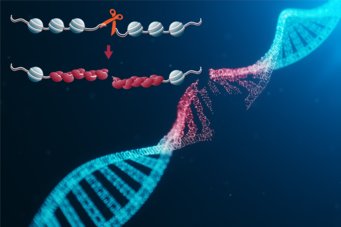New method for the analysis of DNA double strand breaks
Researchers at the Max Planck Institute of Biochemistry have established a new technique based on Next Generation Sequencing that determines whether a protein binds to single-stranded or double-stranded DNA.

DNA in our cells is constantly exposed to damaging agents, such as UV light or byproducts of cellular metabolism like reactive oxygen species. The most severe form of DNA damage are DNA double stranded breaks. In order to keep the genetic information intact, cells need to repair these double stranded breaks. The most faithful repair process is homologous recombination, which involves DNA end resection, the degradation of one DNA strand at each side of the break. Two different domains are therefore created around the double strand breaks: one containing single-stranded DNA and one containing double-stranded. Researchers from the team of Boris Pfander, head of the research group "DNA Replication and Genome Integrity" at the Max Planck Institute of Biochemistry have now developed a ChIP-seq-technique, based on chromatin-immunoprecipitation followed by next-generation sequencing. With the help of this ChIP-seq method, the researchers were able to determine whether a protein binds to the single stranded or double stranded DNA domain. Therefore, they could shed light on the fate of nucleosomes, the fundamental unit of chromatin, during DNA end resection. Martina Peritore, first author of the study, explains, "Previous in vitro data have shown that nucleosomes can form not only on double-stranded DNA but also on single-stranded DNA. In contrast, we observed that in yeast cells nucleosomes are removed from DNA during resection. That is, DNA resection and nucleosome removal are coupled." These results suggest that the epigenetic information associated to nucleosomes is lost once cells enable resection. Peritore continued, “Our work therefore raises the question of how such information is restored after a DSB has been repaired”. The study was published in the scientific journal Molecular Cell.
Original publication:
M. Peritore, K. Reusswig, S.C.S.Bantele, T. Strau, B. Pfander
'Strand-specific ChIP-seq at DNA breaks distinguishes ssDNA versus dsDNA binding and refutes single-stranded nucleosomes', Molecular Cell, March 2021
DOI: https://doi.org/10.1016/j.molcel.2021.02.005


